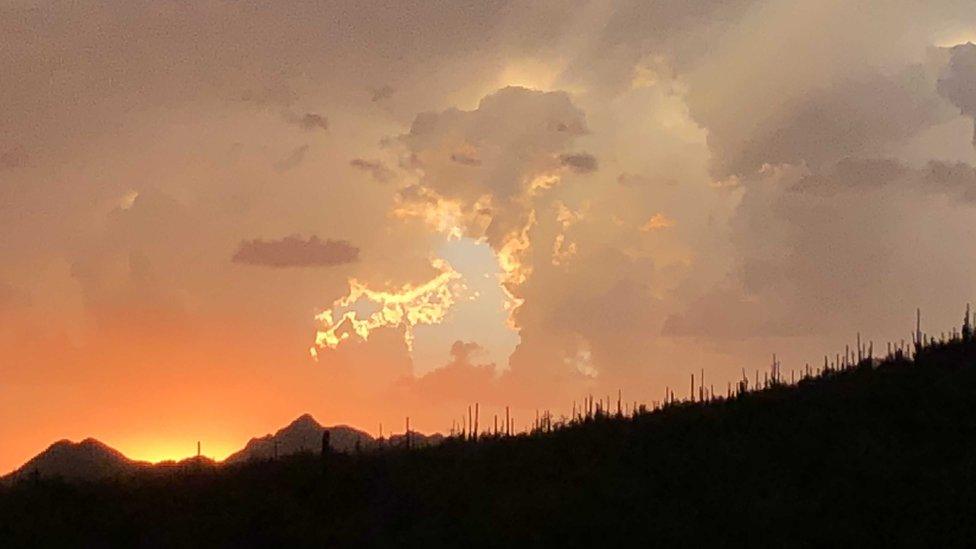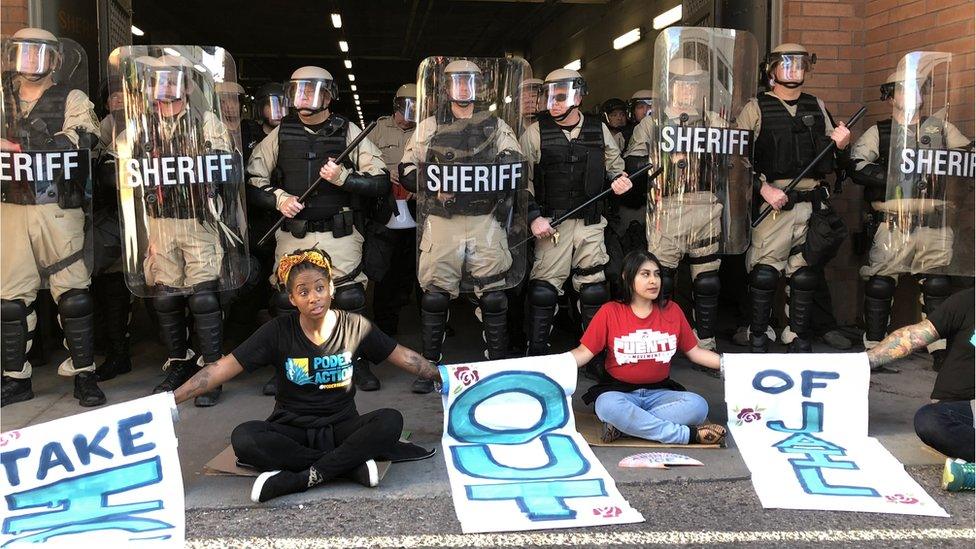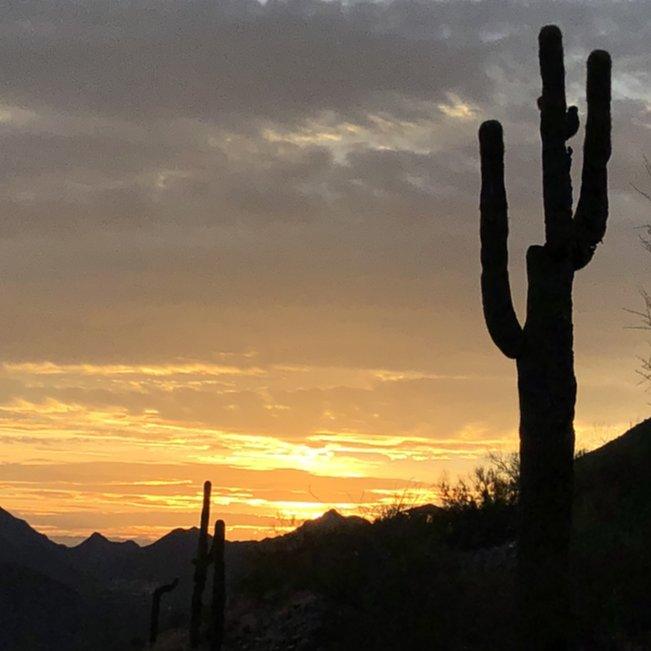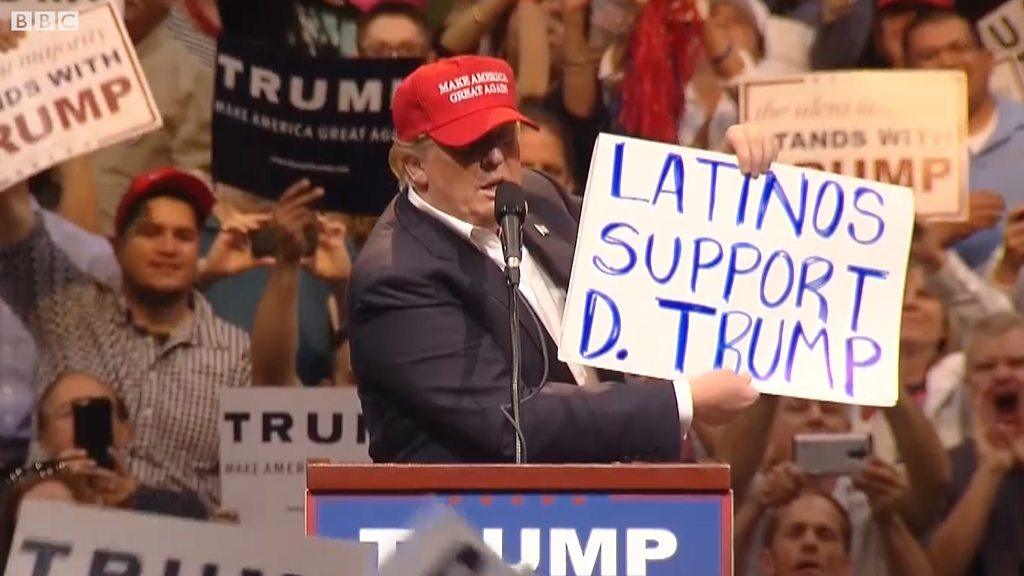US mid-terms: The political storm brewing in Arizona
- Published

Republican Martha McSally will face off against Democrat Kyrsten Sinema in November
It is sunset in Arizona and Mother Nature is cracking her knuckles as a summer storm rolls over the desert.
Face the east and between blasts of forked lightning the sky is midnight-black. Turn around and the sun's dying rays burst from a bright blue gap in the clouds over the Tucson Mountains.
The electric air smells of damp earth and summer rain.
This is monsoon season, a time of drama in the heavens and, it turns out, on earth too.
The next afternoon, with the skies clear, protesters have gathered in Phoenix outside the Maricopa County jail.
They are angry about the immigration policies of the county, the state and the nation.
"There should be no borders. There should be no walls," declares Parris Wallace, who is sitting on the ground chained to three fellow protesters, blocking an entrance to the building.
"We didn't even ask to come here," adds Ms Wallace, who is African American, referring to the slave trade that transported her ancestors across the ocean. "We were brought here. We were kidnapped."
Nearby, a fellow protester holds up a sign which reads "No more deportations".
Just a few feet away though another placard carries the opposite message: "Deport All Illegals".
It is held aloft by a rival group of demonstrators. Many of them are armed and several carry photographs which they say memorialise American citizens who were murdered by illegal immigrants.
"Send all these people back to Mexico," declares Adam Rocha, gesturing towards the larger group, many of whom are Latino, like him.
"What the hell are they doing here?" he shouts.

Parris Wallace (left), protests immigration policies outside the Maricopa County jail in Phoenix
Mr Rocha sports a T-shirt bearing the words "Patriot Movement Arizona" and a baseball cap which reads "Border Patrol". He has a crucifix on a chain around his neck, a rifle slung over his shoulder and a handgun on his belt.
What are the weapons for, I ask?
"To keep them peaceful," he replies, again indicating the crowd. "If they attack me, I'm shooting them. This is Arizona!"
And, indeed, America.
More than any other topic, it was immigration which provided powerful ammunition for Donald Trump's nativist presidential campaign.
The businessman began his bid for the White House by disparaging some Mexicans as criminals and rapists; he went on to suggest that an American judge of Mexican heritage was incapable of doing his job because of his race; he reportedly referred to Haiti, El Salvador and African nations as "shithole countries"; he promised to suspend all Muslim immigration; and he tweeted that illegal immigrants would "pour into" and "infest" the US.
These comments, and plenty more like them, continue to energise and animate Mr Trump's core supporters and to infuriate and enrage his opponents. The reactions of the two groups may differ wildly but they are clearly linked.
In a state like Arizona, where the Latino population is around 31% and growing, external, this presents a hazard for the Republican Party.
Why these Latinos love Trump
In the primary election to select the party's candidate for the mid-term elections on 6 November - when voters will pick a replacement for the retiring Republican Senator Jeff Flake, a vocal Trump critic - the challenge was on full display.
During the campaign two candidates on the rightward fringes of American politics, Kelli Ward and Joe Arpaio, succeeded in dragging the eventual Republican winner, Martha McSally, in their direction.
As the race tightened, the former fighter pilot abandoned her support for immigrants who were brought to the US illegally as children, removing from her official YouTube channel a video which promoted her centrist position on the issue.
She also began to sound more supportive of Mr Trump's plan to build a great wall along the border with Mexico and generally embraced a president whom she once derided as "disgusting" and for whom she may not actually have voted in 2016 (she won't say).
Why? Because the president, polls suggest, remains enormously popular with core Republican voters, that is to say those most likely to vote in primary elections, with approval ratings of around 85% (although drill down into the numbers, external and the picture is less flattering than it first appears).
Of course hardening her stance will make it tougher for Ms McSally to win over independents and moderate Democrats in November's general election.
Republicans hold the US Senate by the precarious margin of 51-49 and are desperate to retain Mr Flake's seat in Arizona, a state which Mr Trump won in 2016 by less than four percentage points, external. It is one of 35 Senate seats up for grabs, along with all 435 seats in the House of Representatives.
The other Senate seat in Arizona, which was held by another prominent Trump critic, the late John McCain, will not be on the ballot as the incumbent's death came too close to the election. Instead the state's Republican governor Doug Ducey will appoint a place-holder until 2020.
Mr Ducey is under pressure from fervent Trump supporters, external to find a replacement in the president's image.
Spend some time among those supporters - the red baseball cap-wearing, Make America Great Again Trump base - and it quickly becomes clear that there is a gulf as wide as the Grand Canyon between them and their opponents.
In fact, these days, they barely share a lexicon.

Time and again in interviews with his fans the president's own language - blasted out by Fox News television, conservative talk radio and websites like Breitbart - is deployed to defend Mr Trump and attack the Democrats.
The following quotations are all from Trump supporters whom the BBC interviewed in Arizona in the run-up to the primary election. All were on camera and on the record.
Many insisted, without providing evidence, that the Democratic Party intends to implement policies espoused by Ms Wallace and her fellow protesters by scrapping all border controls. They recited the Trump mantra: "a nation without borders isn't a nation", external.
They also accused Democrats of planning to disarm all American citizens - "Democrats are gun-robbers" - which is not the party's policy, and when questioned about the multiple scandals, convictions and allegations surrounding Mr Trump and his campaign they repeatedly returned to what they alleged were the crimes of Hillary Clinton - "there is no digging into collusion by the Hillary campaign" - and to Barack Obama, who remains a despised figure for many on the right. Mrs Clinton denies committing any crimes.
On the campaign trail, one Republican candidate for Senate, the controversial former sheriff Joe Arpaio, even continued to promote the racist lie that the first black American president had produced a fake birth certificate.
The Trump base talks about an "illegal invasion" and "40 million illegal aliens" - "these people are not here to better themselves or better society", in the words of one - Latino - presidential supporter.
The 40m figure is sometimes quoted on right-wing media, although independent studies based on US government data, external generally put the actual number closer to 11 million.
In our interviews Mr Trump's supporters insisted that the separation of immigrant children from their families at the border either did not happen as was widely reported - "media dishonesty" - or that it did happen but was the fault of the parents - "the peril that they know they're going to face" - or it was necessary for their protection - "these children are trafficked for the sex trade" - it was actually good for them - "much better conditions" - or it was "a policy that was started by the Obama administration", which is at best extremely misleading., external
The Border Ranch: Living on a 'smuggling route'
In short, Trump voters and their opponents are living in different worlds. They are consuming different media, being presented with radically different versions of what is happening in the US, embracing dramatically different solutions and have become essentially unable to agree on what constitutes fact.
All of which makes it practically impossible to find solid ground on which Americans can stand and debate policy. A crevice has opened in the public square. If a functioning democracy requires conversation, compromise and consent then the US is in serious trouble.
The messages that have been hammered home in conservative media for years suggest that Democrats are not just opponents, they are the enemy; many immigrants are not just in the US illegally looking for work, they are criminal aliens intent on murder and rape; and the press are not just performing their vital journalistic duty by casting a critical eye over the administration, they are enemies of the people.
Liberal critics of Republicans are guilty of demonising their opponents too. Mrs Clinton's description of some Trump voters as a "basket of deplorables" continues to reverberate and has been resurrected by the president's former senior adviser Steve Bannon as a battle-cry for the November election, external.
The US teens training in border patrol
Alessandra Soler, the executive director of the American Civil Liberties Union in Arizona, describes what is happening in the state and the country generally as "very frustrating".
She traces many of the problems back to policies on immigration.
"Arizona," she says, "has been the Petri dish for some of the most hostile anti-immigrant laws in this country."
Ms Soler says a backlash against "the nation's first racial profiling law" which was introduced in the state in 2010 and later partly struck down by the Supreme Court, has faded with the election of Mr Trump.
A nativist, anti-immigrant agenda is on the rise again, she contends.
For that, many Trump supporters in Arizona are unapologetic.
Back at the duelling protests, Lesa Antone from Phoenix is fired up.
"Republicans are going to win," she says, "because we don't have a choice… what the Democrats have in store for this state and this country will not stand."
Perhaps the storm has not abated after all.
- Published28 August 2018
